The Day After

When the dust settles and life reemerges from lockdown, how will our communities, reeling from the pandemic fallout, readjust to a new reality?
Part One of a special project
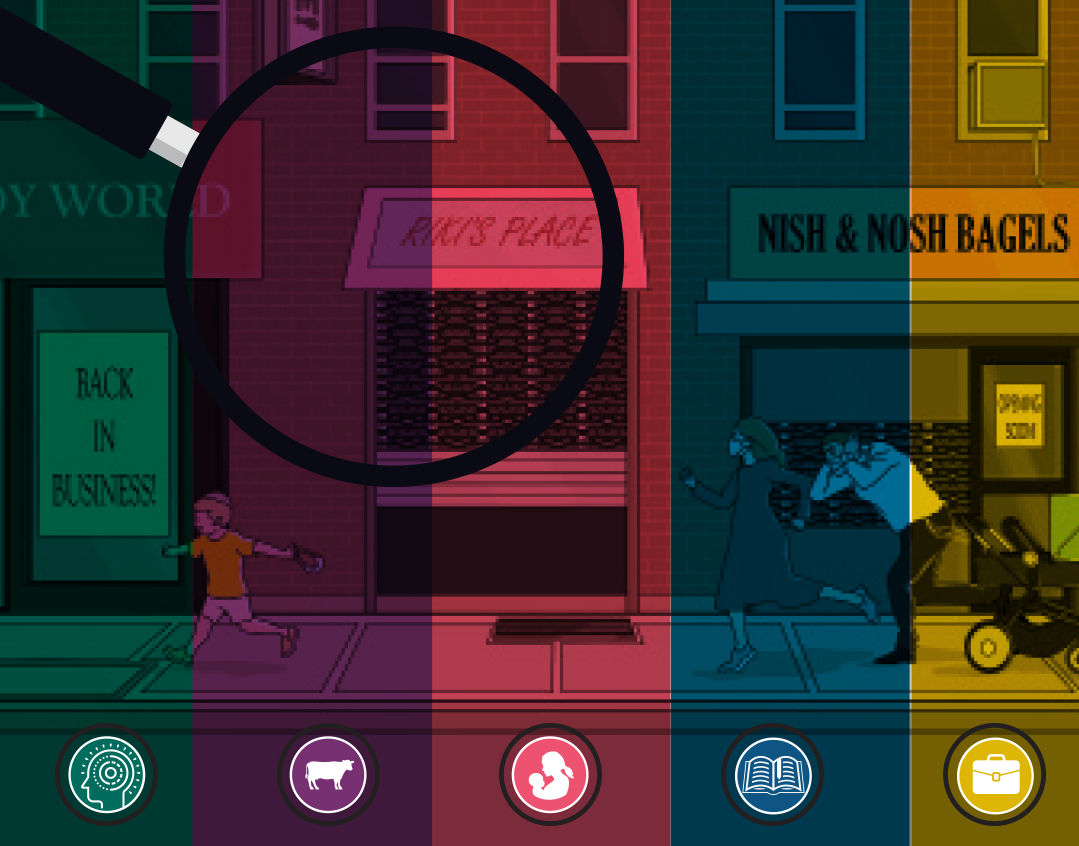

By Gershy Tress
R
ewind to January of 2020 for a minute, and come have coffee with any young guy in Lakewood: He learned in kollel for a few years, got a job, and now he’s ready to go out on his own, perhaps into real estate, medical billing, or some sort of import.
No doubt, he is filled with optimism and confidence; HaKadosh Baruch Hu’s Hand is open and there has never been such an abundance of opportunity.
Now fast-forward to June, maybe July of 2020. The community is reeling. The largest void is felt by the families mourning the hundreds of shomrei Torah u’mitzvos who’ve been felled by this plague. But there are lesser korbanos too: the collateral damage in a tightly bound community that’s had its inside ripped out.
And when the dust settles, our young working guy is facing a crisis he never prepared for. Lakewood is a hub to many Amazon sellers, a fact that made it a perfect setting for entrepreneurs looking to launch small businesses. For so long, the mantra has been “buy it, buy lots of it, and you’ll find a customer, whatever it is.”
Even those who had several years of success, and were comfortable enough to start saving money for simchahs down the road, or perhaps an extension on the house or a summer home in the Catskills, are now in real trouble. The savings are gone — used to tide them over and meet expenses during these months — and now these young businessmen will be starting from scratch. The effect on their tzedakah giving or general spending will be felt immediately.
I have a friend who traveled to China not long ago, investing his life savings — chasunah money, money he and his wife earned over the years working in camp — in manufacturing his own line of paper goods, which he then sold on Amazon. He did nicely, selling primarily to people hosting parties and events. Now there’s a restriction on large gatherings, so there are no sales, no income, and no way to keep the business running.
Another acquaintance sank everything he had — money he got from grandparents and in-laws — into a piece of real estate, and he erected a small strip mall. He lined up other investors and a bank loan, and the small construction fee he took out was how he fed his own family. He planned to have the project finished this spring, with stores moving in by early summer. Now construction is halted, and the tenants he signed up may no longer be in business. How is he meant to live?
Or how about the guy who “made it.” After working for years as a nursing home administrator, he was able to invest in a nursing home of his own. He knew the business inside out, and left his job to run his own home, the fulfillment of a dream and reward for years of 18-hour days.
Then came coronavirus, and the workers stopped coming in because they got infected. He pulled together a skeleton staff and paid them time and a half. The rehab patients he was counting on to fill the beds stopped coming because there was no longer any elective surgery, so no rehab either. Now he can’t cover the huge mortgage and he can only hope the bank will defer — forget about a salary for himself.
The one thing all of the people above — real people, with families and lives who live near you and may well be reading this magazine right now — have in common is that three months ago, they were riding high.
This is reality, for now. Where’s the data? Who says the impact is that severe? Consider this. A local Lakewood shul with mainly working members has been holding a supper giveaway every night since COVID-19 struck. On a regular evening, they serve supper to 250 families: On a typical night, the askanim in charge handed out 1,200 ice creams, 275 pies of pizza, 500 orders of french fries, 200 salads. This is approximately 1,200 meals! In Lakewood of 2020, in a kehillah of working families!
Now, the next question. What is the long-term picture? Can they rehabilitate their businesses and survive? The media tells us about the various programs — bailouts and PPP and EIDL — all meant to tide over businesses through a few tough months until the economy starts pumping again. These programs will help, to a degree, but there will likely also be once-promising businesses that won’t reopen: There will be too much unsold inventory, too much debt, too much work needed to find the groove again. Selling off stuff at a fire sale can bring in cash, but it might not be enough to keep a business afloat.
The business owners I talk to feel the only way they can survive the rehabilitation period is through interest-free loans, payable over a two-year period. Not everyone has access to such terms, but, as the rabbanim here in Lakewood have told me numerous times, if there are those in a position to offer those loans, they will earn eternal merit. U’mi yodei’a im l’eis kazos — Who can know whether you’ve been gifted for precisely this opportunity.
Another thing to keep in mind is that even those businesses that had enough cash on hand to survive the virus will reopen to a very different world. With social distancing in effect, only a limited number of customers will be able to come into stores at once, making the shopping experience inconvenient and much less of an enjoyable social outing. The only customers to step inside will be those who really need the item in question. No one will go in “just to look around,” and a retail establishment can’t really survive that way. Even those stores that open up online portals can never hope for the same volume of sales.
There’s also the spillover effect. More struggling frum households means less disposable income. That means less overall spending in frum restaurants, bookstores, and vacation sites. The caterer is in real trouble after months with no work: Even if he still has a staff, the booking will be smaller and more modest, which affects all his suppliers. The eidem in kollel is in trouble without his father-in-law’s monthly checks and full tuition is a thing of the past, so where does that leave the school?
The result? I would guess that 50 percent of frum businesses will be in real trouble within the coming year.
If there is a silver lining, it’s that the gvirim are waking up. I’ve seen it and continue to see it. They realize their responsibility. They realize that parnassah was never in their hands.
Every crisis has a before and after. There is always a new and different post-crisis reality. The federal government will adapt post-crisis. They created the TSA after 9/11, and after COVID-19, they will build more hospitals with more room for critical patients.
What will we do?
Based on conversations with rabbanim and askanim with much more experience than I, we need an immediate fund to help people who are out of work. Beyond that, we need to see some deeper changes in our approach to wealth and spending.
I’m not one to say what has to change, but those involved with helping families get through the month keep davening for the high life to end — the helicopter rides to the airport and Pesach in Florida mansions and parties that are just a race to out-glitz the neighbor. They are desperately hoping that we won’t end up back there.
HaKadosh Baruch Hu has sent a very clear message to the millennial generation. Months ago the nisayon was to live within one’s means and stop keeping up with the Joneses. Now that won’t be the struggle. It’s time to scale back and live below your means. If you’re fortunate enough to be where you were on Tu B’Shevat, then do it out of good taste and basic decency, because many of your neighbors are in a very different place.
Granted, many heimesh Yidden make a living in the simchah industry, providing one service or another — music, high-end catering, party rentals. The wealthiest element will still make simchahs and there will still be business for these hardworking Jews, b’ezras Hashem — but the hope is that those who don’t really fit into that financial bracket won’t feel the pressure to emulate their spending.
It means that not every single creative woman will become a party planner (they will find other jobs). Singers will still have who to sing to and for, it just won’t be without control and limit. And people will not feel the same pressure to follow the herd and make sure their simchah includes all the “must-haves.”
Slow down, the rabbanim are saying.
A wealthy man pledged a very large amount of money to help those affected by the virus, and I asked him what drove him to commit to such a generous amount. “Gershy,” he said with feeling, “don’t you realize it’s Ne’ilah? Our last chance to ask HaKadosh Baruch Hu to spare us? Who knows what our businesses will look like on the other side of this… we need all the zechusim we can get.”
We need all the zechusim we can get.
Gershy Tress is a Lakewood-based small-business owner and a member of the board of Bikur Cholim of Lakewood.
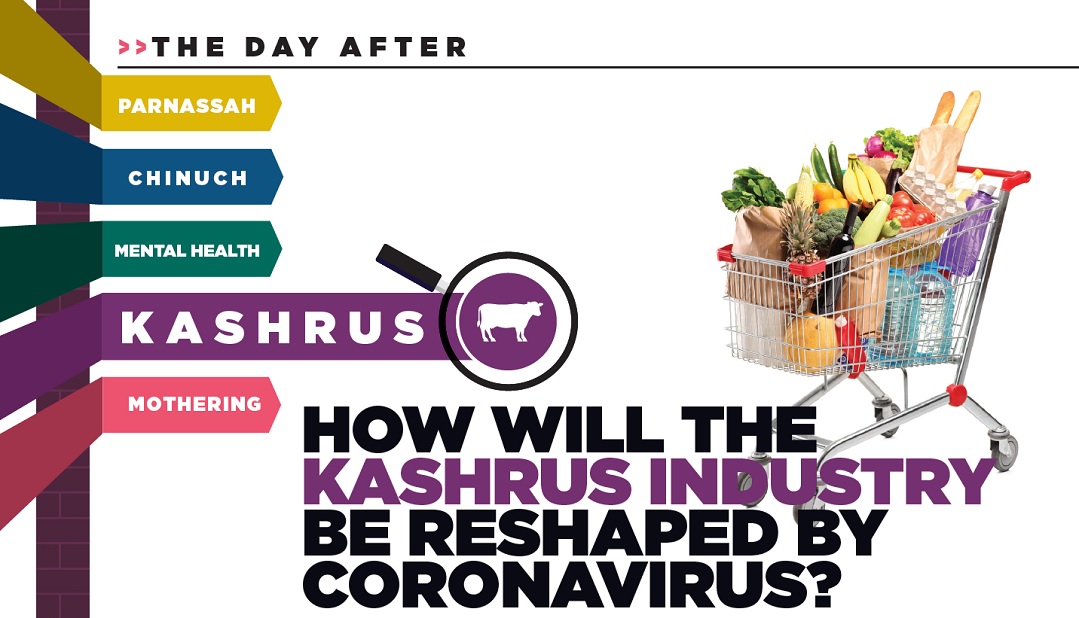
By Gedalia Guttentag
As the coronavirus has shut down the world economy and driven millions into unemployment, one sector has boomed: the food industry, which has struggled to keep shelves stacked as global supply chains shut down.
But kashrus agencies and the wider kosher industry are racing to design solutions for their own unique coronavirus-era problems, from how to conduct hashgachah remotely, the risk of being caught up in the geopolitical tussle over China, and a threatened contraction of the kosher food industry.
“New certification is frozen for the moment, because we can’t give hashgachah without access to factories,” says Rabbi Moshe Elefant, who is chief operating officer of the OU. “In the first phase when most factories in China and then Europe were under lockdown, there was nothing to certify. But now that China — where there are more than 600 OU-certified factories — is opening up, it’s hard to get mashgichim.”
Hashgachah in China involves traveling Israeli mashgichim and local Chabad shluchim, Rabbi Elefant explains. “Most of the shluchim have left, and for mashgichim to come — even if they can get a flight — involves two weeks’ quarantine when they come back. Who wants to work like that?”
Absent boots on the ground, the OU has turned to a mixture of technology and detective work to continue existing kashrus certification. “In places that don’t need constant hashgachah, such as facilities only making kosher pareve, we have been operating by virtual hashgachah,” says Rabbi Elefant. “Where the mashgiach knows the factory well, he directs a worker there on Zoom to show him around the machinery. ‘Show me this machine,’ or ‘Turn right here to this piece of equipment,’ he’ll say.”
The technology-based process, he says, is then backed up by old-fashioned detective work: comparing the paperwork, figuring out which ingredients are coming into the factory via invoices.
That combined method is employed at more than half of OU-certified factories in China, but in places that are more complicated from a kashrus point of view, such as those that produce meat, cheese, or wine, hashgachah has ground to a halt. In addition, no new business of any kind can go forward. “Companies are still coming to us for certification, but we can’t do that remotely — a mashgiach needs to know the factory very well.”
Remote hashgachah is not the only change that coronavirus has forced on the industry. With economies opening up across Europe again, the kosher food industry has been forced to be creative in order to keep supply chains open over the last few weeks, says Eliyahu Mayevski, a buyer for Israel’s Adom Group, a leading food importer that supplies national chains such as Rami Levy and Shufersal.
“When the corona panic broke in March, we received an urgent order for kosher l’Pesach sugar,” explains Mayevski. “We contacted a Polish sugar factory, the Eidah Hachareidis sent out a mashgiach from Belgium, and we booked four production days. After only two days, Poland closed the borders, so we had to send it by truck to Croatia and then ship it to Israel, which shortened delivery by two and a half weeks, but cost us a lot.”
Besides a new need for flexible distribution systems, the real impact of coronavirus, according to Mayevski, could be a shrinking of the booming kosher market.
“In Israel there are now a million unemployed, and whereas people will still buy oil and sugar in hard times, they may cut back on luxuries,” he predicts. “That’s why we’re much more hesitant now on developing new product lines like candies.”
There are a number of indicators that this reduced demand is already hitting Israeli retailers. One, ironically, is the tidiness of supermarket shelves. “Our agents said that the shelves with our products are normally messed up by customers, but now they’re neat, so clearly there are less buyers.”
Another ominous sign comes from the supermarkets’ buying patterns. “One of the national chains that we supply is usually very sensitive about our delivery of sugar right on time. Now they’re asking if we can delay the shipment.”
Mayevski says that it’s too early to say definitively how much of the reduced demand is due to people working their way through large stocks bought in the mid-March panic-buying, and how much is because people now prefer to shop in small stores that don’t have large infection-prone checkout lines, but he’s clear that the kosher food market is heading for troubled waters.
“That will have to be reflected in lower prices for consumers,” he says.
Perhaps reflecting a difference between American and Israeli consumers, the OU’s Rabbi Elefant doesn’t think there’ll be a contraction of the market. “The direction of expansion is strong, because kosher consumers are interested in so many food products that manufacturers and distributors will figure out how to satisfy customers.”
And, he said, it will take time to see long-term effects in supplying and stocking the stores. Long supply chains for many products mean that kosher food eaten today dates from the pre-coronavirus era. “We have not seen shortfalls yet,” explains Rabbi Elefant, “because companies keep large amounts of raw materials in stock months in advance — it takes a long time to trickle down.”
With poultry for the US kosher market produced locally, the only interruption to supply was a result of panic-buying and hoarding in mid-March. The same holds true for the portion of the meat market slaughtered locally. The balance, which comes from South America, is a mixed picture. “Shechitah has continued in Mexico, while that in Uruguay hasn’t restarted after Pesach,” says Rabbi Elefant. “But given the fact that there are no restaurants or simchahs, unfortunately, there is no shortfall.”
If kashrus agencies didn’t have enough to worry about, coronavirus risks pulling kashrus into geopolitics, as the American government may lean on companies to source goods from countries other than China.
“I estimate that there are close to 2,000 factories in China with hashgachah,” says Rabbi Elefant. “Certain raw materials — for example all the garlic produced in the world — come from China. It’s possible that American factories won’t want to buy products produced there.”
Possible, he says, but not probable. “I personally don’t believe that China will be pushed out of the world economy. But when I started at the OU 33 years ago, there were just seven factories certified in China, and we were all eating. We can survive.”
And where revenue is concerned, authorities will often show flexibility. “After Pesach, Israeli mashgichim were due to come back to Poland to do shechitah of fresh meat for Israeli consumers,” says Eliyahu Mayevski, “but the borders were closed. So the Israeli embassy in Poland helped obtain permits for entry, because the Poles want that business. We chartered a Boeing-737, and sent 27 shochtim. They were quarantined for two weeks and just started work again.”
A side effect of the close communication with factories from Italy to China has been a close-up view of how the whole world is suffering together. “Normally there are barriers between people around the world — we are all different,” says Rabbi Elefant. “What is very uncommon in the current situation is how the whole world is affected by the same problem. Everybody in China is asking how we are. On a personal level, the connection between us has become extremely strong.”
And with a bird’s-eye view of the international kashrus system, the OU has become a resource for companies everywhere. “Companies call us daily, ‘Can you help us get different ingredients?’ Borenstein Caterers, a subsidiary of El Al that produces kosher airline meals, almost closed when the flights stopped. We helped them get a contract to supply the New York Department of Education’s free kosher meal program.”
As long as coronavirus continues to cast a shadow over normal life, there might very well be shortages of French camembert cheese in US kosher aisles, and distributors might have to contend with sudden travel restrictions again.
But what the OU has learned from this crisis, says Rabbi Elefant, is that mashgichim need to know factories like they know their own homes, and the value of technologies to conduct remote inspections. In fact, those remote inspections might very well reinforce the work of mashgichim even when they do go back.
“But I always go back to think about 9/11,” he says. “The OU offices are two blocks away from the World Trade Center, and some of our staff saw the planes fly past the windows. Afterward, Rav Yisroel Belsky ztz”l said, ‘The world will never be the same again.’
“But in a certain sense, the world does go on — and I think kashrus will be okay.”

By Dr. Ruchama Fund
COVID-19 has changed so many essential elements of psychotherapy. At a time when individuals in therapy want more than ever to meet face-to-face, social distancing does not allow it. Teletherapy (phone or video) is being practiced instead, but with significant challenges. Privacy is crucial to the therapy process, so some sessions are being conducted in parked cars, locked bathrooms, and backyards. Babies and pets have been welcomed into sessions.
The overloaded and primitive technology of video/Zoom sessions poses an additional challenge: breaking up, freezing, and numerous instances of “I didn’t hear you, could you please repeat what you just said.” Instead of the attunement that is so comforting in a good face-to-face session, we are experiencing a mismatch between the visual and the audio that can be quite unsettling. This week I conducted a session with video for visual and phone for audio — still a compromise, but at least the sound was clear.
We need feedback from our patients about what is and isn’t working for them; we need to remember to ask for it.
Along with the challenges, COVID-19 has brought new discoveries to both clinicians and patients. I would have predicted that individuals in treatment for anxiety disorders and particularly OCD would be having a very hard time. In fact, they are doing better than expected, and in many cases better than those for whom anxiety is a new experience. They suddenly feel “normal,” which has diminished the shame and self-criticism that can accompany an anxiety condition. They have the resources and skills that they had gained from their treatment. They have been through a lot and they know that they can survive.
Our patients are also making new discoveries about their latent strengths. Those who are sheltering alone are realizing both the positive as well as the negative effects of solitude. Single women were thrilled to discover that they were capable of conducting a beautiful and meaningful Seder. On the flip side, Shabbos can feel particularly lonely when sheltering in isolation.
Another type of discovery: Individuals who had not reached out for help in the past are realizing that they could benefit from psychotherapy. Relief Resources has conducted a survey, and has a database of therapists who are conducting teletherapy and are accepting new patients.
We depend on our roles in life for a sense of identity and purpose. These roles may include the role of grandparent, active participant in the classroom or shiur, or breadwinner. Many of us are unprepared for how unsettled we feel when we cannot act within our familiar roles. But we’re finding that from that experience of unsettlement comes new realizations. Perfectionists are observing that they can tolerate a relaxation of standards. Workaholics are recognizing that relationships matter, that we are humans who need to connect, not work machines. And people are discovering that they have a new gift to offer, the gift of listening, the gift of checking in with people they care about.
Not always has this virus brought new themes into existing dynamics; sometimes it has just intensified the existing ones. My colleagues and I are helping parents understand how to be an anchor for their children, how to make the home environment safe. We are delighted to discover that some children who suffer from anxiety in school for academic or social reasons are actually flourishing during this time, thanks to their parents creating a safe haven for them. We are helping individuals pay attention to the following questions: “This is a chapter in life that will be remembered. How do you want to be remembered by others? How do you want to remember yourself?”
Before COVID-19 hit, numerous individuals have endured difficult marriages by creating a rich life outside of marriage that has been fulfilling as well as distracting. For some, sheltering together has been unbearable and has brought latent hatred to the fore. Others have found, to their surprise, that for the first time they were able to collaborate peacefully to make Pesach. They have found that there is comfort in the presence of another human being, no matter how flawed. In addition, many people have taken this crisis as a wake-up call to improve their middos. They are learning to compliment, to apologize, and relationships are in fact improving.
We Yidden have already witnessed in ourselves an appreciation for institutions we may have taken for granted: our shuls and schools, our grandparents and our leaders. We also have an increased appreciation for the mitzvah of bikur cholim (particularly in hospitals and nursing homes) and the mitzvah of kavod hameis. I anticipate that there will be deep sadness for the limited way we were able to fulfill the rituals of mourning that give honor to the niftar as well as comforting the avel.
We, the community of therapists, are in the same boat. We, along with the rest of humanity, are experiencing grief, fear, illness, uncertainty and economic loss. Every day we have to make choices between the needs of our families and the needs of our patients, between the need to maintain our equanimity and our desire to serve others. At the same time, our sense of meaning and purpose is heightened. We feel blessed to be able to help people, to focus on others. This is our life, this is what we are about.
I have been struck by how much love I feel for my patients, how much I miss seeing them in person, welcoming them into my office. I notice how touched I am when a patient expresses concern for my wellbeing, wanting reassurance that I am okay. Perhaps in our vulnerability we are less defended, our emotions closer to the surface.
How are we handling this? The pain is great, and we can’t take it away. We have to remember, as Rav Dessler reminds us, that a person has to do, not to accomplish. “Lo alecha ha’melacha ligmor…” As therapists, we come in the middle of the story and we leave in the middle of the story. We do our heartfelt hishtadlus; accomplishing is not in our hands.
What of the future? We are already seeing some of the neurological effects of COVID-19: loss of the sense of smell and taste in many patients, seizures and confusion in others. I would not be surprised to find that some patients might be left with anxiety and depression as a result of brain inflammation. How many survivors of hospitalization will recover, but suffer from lingering health anxiety, separation anxiety and even Post Traumatic Stress Disorder? Will health providers and family members experience moral distress, wondering, “Did I do the right thing? Did I do enough?” We need to be prepared to help in all of these cases.
In conversations with colleagues, there is a consensus that the somatic therapies are so helpful during this crisis. I am hoping that many more therapists will be trained in this modality. Another hope for the future: that the insurance companies will continue to reimburse for teletherapy when the crisis is over. We were reluctant to embrace it, but we are now accepting it as a viable option.
What I am hoping for most of all is that our collective experience of darkness will inspire us to cherish the light. My role model for this is my father, Dr. Hillel Seidman. His appreciation of every simchah and life cycle event was intensified by his gratitude for having survived the Second World War. At the end of his life, his greatest pleasure was to stand on the street corner in the morning and watch Yiddishe kinderlach boarding their buses to yeshivah. May we experience the same pleasure upon witnessing this seemingly ordinary event, soon.
Dr. Ruchama Fund is a clinical psychologist with a private practice in Flatbush, where she specializes in the treatment of anxiety, depression, OCD, AD/HD, and family and relationship issues. She teaches a course in Jewish Positive Psychology in Seminar Ve’At Alis, the New York Seminary.
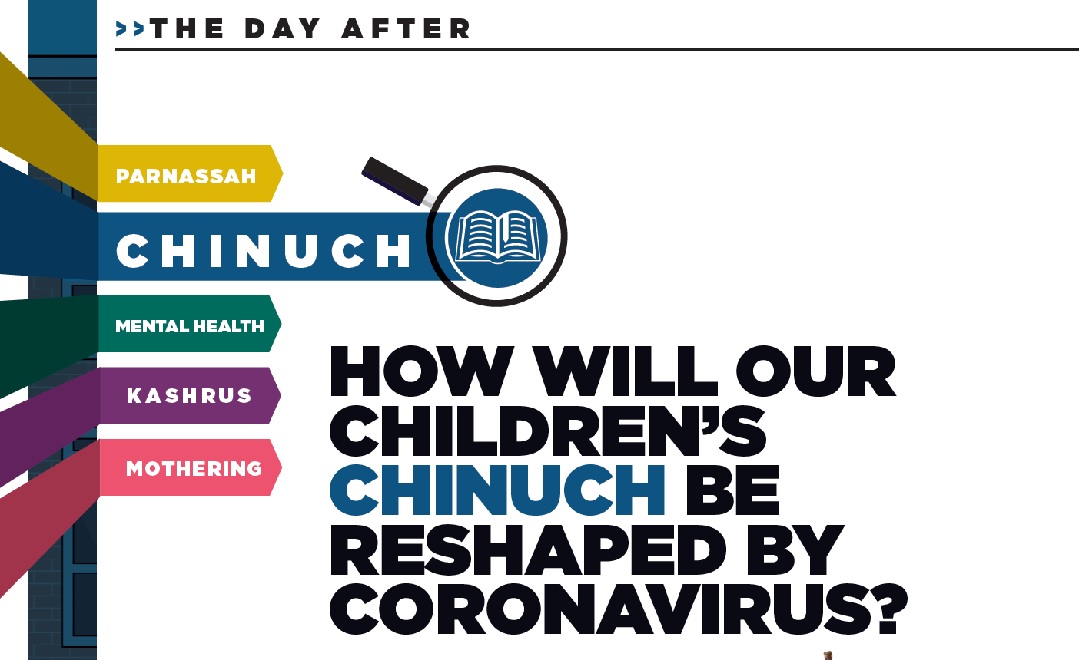
By Rabbi Menachem M. Karmel
Every dramatic incident has an aftermath. Anyone who has flown since 9-11 and has had to remove his shoes at airport security can attest to that. As we struggle with COVID-19, we’re getting used to multiple “new normals,” many of which will become new ways of life. From a chinuch standpoint, this virus will leave us with a mixed bag of after effects: some positive, and some that we’ll have to overcome.
On the core educational level, the remote-learning model will result in inevitable lapses. Many of our children will not cover their yearly curriculum. Beyond the amount of material missed, however, the remote model results in a different loss: the overall hashkafah, feeling for Yiddishkeit, geshmak in learning, and so many other non-tangible but very real elements of our children’s learning experience, may suffer severely. This risk is even more potent in homes that are less reflective of those values; for many of those children, their heavy dosage of “Yiddishkeit-infusion” happens at an assembly, a shmuess, an unscheduled class discussion and by seeing their rebbi or morah’s expressions and animation when discussing various topics.
Another negative effect: the extended time spent at home without formal structure has drawn many of our youth towards more screen time, and I fear that there will be victims of internet misuse, with the dark and slippery slope that it entails.
On the upside, many schools have successfully risen to the challenge of communicating and interacting with parents during this trying time, and I feel those efforts will result in a long-lasting bond of renewed respect and collaboration. Parents will increasingly look to schools for support in educating their children, and many schools who are seeing how much parents appreciate interaction will develop and embrace this relationship.
Perhaps the greatest positive change is the reset of the home environment as a vital part of our children’s Torah growth. The resilience of the Jewish home has been fanned and is now a healthy flame. Families have launched in-house initiatives and are stepping up in the most profound, creative and dedicated ways.
A creative father I know adapted an ingenious method for memorizing the 613 mitzvos; about two months in quarantine his children could already repeat over 100 of the mitzvos by heart. A devoted father is giving a daily Taryag Mitzvos shiur to his boys. A caring mother supplies her children with almost-daily special activities, from a family carnival to challah baking.
Many parents are also strategically “outsourcing,” taking advantage of the many supplementary call-in lines from Pirchei, the Wonderword hotline and the like, supplying doses of Torah hashkafah and excitement for mitzvos, as the children hear stories, shiurim and lessons from master mechanchim. Two programs, Night Seder America and Studying Navi, have respectively close to 1,500 and 4,000 talmidim joining daily!
The home has become a true hub of lively chinuch, and I believe we in the chinuch world will reap the rewards of this development for years to come. In a sense, the school-home relationship can be compared to the process of preparing a gourmet meal. The parents drop off the main ingredient: a well-rested and prepared child. The rebbi/teacher is the chef who adds just the right amount of seasoning, focusing on the texture, the sweetness, the spiciness. The dish is sent home to cook, but it still needs careful basting, the proper temperature, some last-minute spices, and a watchful eye to make sure it is finished properly.
Before the days of Yehoshua ben Gamla, every child received his Torah chinuch at home; yeshivos were reserved for senior talmidim that already climbed the ladder to more intense learning. After he revolutionized our chinuch model, yeshivos and Bais Yaakovs have shifted into place, shouldering the bulk of this task. The home component, in many cases, has been neglected. I believe that it has now been reawakened, and in a truly remarkable way.
Ihave recently shared with my parent body chilling words that Rav Hirsh ztz”l wrote in the late 1800s (quoted in the “Introduction by Translator” to Horeb, “The Classification of the Mitzvoth,” p.1xix). “If I had the power I would provisionally close all synagogues for a hundred years. Do not tremble at the thought of it, Jewish heart. What would happen? Jews and Jewesses without synagogues, desiring to remain such, would be forced to concentrate on a Jewish life and a Jewish Home. The Jewish officials connected with the synagogue would have to look to the only opportunity now open to them – to teach young and old how to live a Jewish life and how to build a Jewish home. All synagogues closed by Jewish hands would constitute the strongest protest against the abandonment of the Torah in home and life.”
Rav Hirsh faced very different challenges than we do and his words were written against a backdrop very unlike ours. However, there is something in his timeless words that rings true even today. Home is an important – nay, integral – part of Torah chinuch, and our current situation has recaptured the hearts of parents.
Despite the many challenges facing families as they navigate a new home-schooling experience, by and large we have a lot to be proud of. The heroic efforts of so many parents have swept them into the arena headfirst, and although unquestionably our parents will give a sigh of relief, excitement and even euphoria when the schools reopen, their reconnection with direct chinuch will remain, I believe, a lasting presence.
So how will these aftereffects of the coronavirus reshape our children’s chinuch?
From a purely educational perspective, I am confident that our rebbeim and teachers will get back into the groove and with their talents and passion, narrow the gaps in curriculum lapses. Even now, rebbeim and teachers are displaying tremendous creativity to get their students actively involved in continued learning, so that any gaps are narrowed.
On the hashkafah level, some of our children may suffer from the vacuum created by spending weeks and months away from the environs of a yeshivah or Bais Yaakov. This may be more pronounced in communities where the day schools serve as the core for Jewish hashkafah and outlook.
If there are any karbanos of misuse of the internet – I wonder if I write “if” with naivete – we can look out for telltale signs, daven, and beseech parents to protect their homes and children from further damage. Only time will tell how far-reaching any misuse will extend. I do believe that parents, however, in their renewed roles as active mechanchim, are doing whatever they can to keep this under control. At a recent, very well received school teleconference for parents, a menahel said, “While there may be room for laxity in regard to viewing materials in respect to the quantity, the quality must not be jeopardized.”
On the bright side, I am excited about the renewed relationship that many schools have been able to develop with their parent body. Some have been more successful than others – and there’s still time for the latter group to join the former group – but this crisis has shown schools how much parents yearn for connection, guidance and advice, and it has shown parents how much their schools can offer by way of chizuk and assistance.
I believe that this blessed dynamic will continue. Teleconferences for parents and menahelim, ongoing chinuch emails and more, are all mediums that have served as lifelines for parents during these turbulent times, and I am sure many will continue.
For students as well, I believe we will see some schools maintaining forms of remote learning opportunities for students out sick or away for simchahs, or even for rebbeim and teachers to use when they cannot be in school. Imagine a rebbi out of town for a simchah, yet still teaching his class via teleconference or videoconferencing, at least for a part of the day. This is a real consideration that can have a very positive impact on the chinuch landscape.
Is there a light at the end of the tunnel? Of course; we never lose hope. Ever. Certainly, as mechanchim, one of our core values is optimistic hope. And there is a real silver lining. Throughout this period, we have seen parents rising to the task in ways they never knew possible. I recently told a parent that a maxim to live by these days is, “A decent day is a great day.” When parents are sometimes experiencing good and even great days, it gives us the hope that together with these ongoing, loving efforts, and with some extra focus upon our safe return to the school setting, we can and will fill the voids and mend the gaps.
Most positive of all, the home environment has been reinforced – or introduced for the first time – as the strong chinuch partner that it should be. When all the dust settles and our children are back in their classrooms, they will be proud to count themselves part of our community’s respective families – the families who made it through a virus that threatened every element of their lifestyle, and who didn’t just survive, but thrived.
Rabbi Menachem M. Karmel is the elementary school Menahel of Yeshiva Gedola of Montreal and columnist of the Circle Magazine’s popular “Ask the Menahel” column. He has presented to educators in Torah Umesorah’s Yesud Ma’aleh and Aish Dos programs, and is a widely-published author of articles on chinuch topics, and has written for and collaborated with the Chofetz Chaim Heritage Foundation on many of their educational projects.
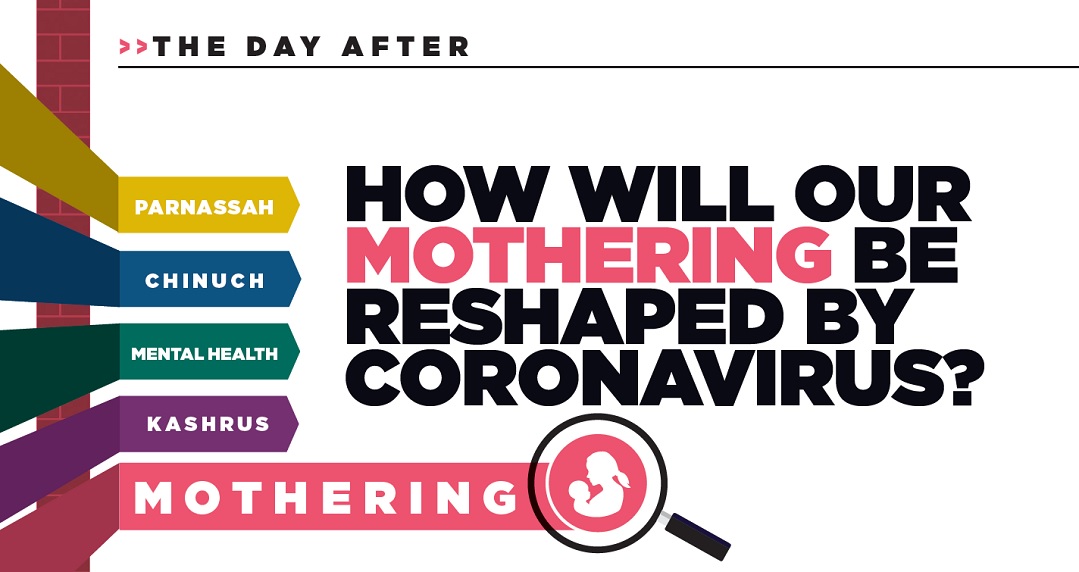
By Shoshana Friedman
Ask any frum mother what her top priority is and she’ll for sure say it’s her family.
In our formal tefillos and informal “please Hashems,” in the sandwiches we make and the laundry we pre-treat and the menus we custom-tailor to every palate of every child, we’re constantly thinking of our children. Their likes and dislikes. Their needs and wants. Their strengths and weaknesses and challenges.
We carve out time for dentist appointments and PTA and story-time. We consult with experts and worry about kriah and do speech therapy exercises. We take parenting classes and sign up for daily chinuch tips and keep track of our positivity ratios.
But…we’re carving out time.
We are squeezing that undeniably top priority into the many other tasks and roles and responsibilities that fill our lives. Because many other roles and responsibilities do fill our lives.
We make the trip to and from the dentist as pleasant and focused as we can – it’s some more precious quality time – but then later that night when supper extends a little too long and the pressure of making up the missed work-hours looms, the pleasantness becomes strained and it’s “let’s finish and get into the bathtub and get to bed so I can catch up on the work I missed during the dentist.”
We savor the time on the couch reading books and pointing to the butterfly hiding between the blades of grass, and we invest our heart and soul and a little prayer into the extra potato kugel that we pack along for our bochurim’s in-Shabbos at yeshivah, but then when someone’s struggling with math and there’s a bar mitzvah we really can’t miss, we bring a palpable strain into the cozy home we worked so hard to create. The struggling child doesn’t feel like anyone’s top priority as annoyance turns to irritation turns to impatience turns to rejection.
We watch our teens as they tune into the complexities of the world and we listen as they voice their questions. We relish the opportunity to discuss real issues with people who care, who think, who demand answers and clarity. We share our own formative experiences and the lessons we learned way back that still resonate. But then there are the guests at the table, the people who genuinely need a meal or a welcome or a home base – and as they drink up our attention, our energy, our focus, the kids around the table wonder where they fit in when their parents have so many multi-layered social commitments and responsibilities toward so many people.
It’s been two months now that we’ve been spending just about every morning, afternoon, and night with the people who are our true top priorities.
There are no simchahs.
There are no appointments.
There are no social commitments.
There are no guests.
It’s not always perfect and it’s not always peaceful. The space is limited, the opinions are strong, and the number of times you can agree to read the same book — or to teenage chefs making late-night spicy fries — gets depleted at some point.
But.
There are no doubts anymore who is the top priority. Your children are being nurtured directly by you every single meal of every single day. The child who couldn’t be toilet-trained now knows his mother can stay with him however long it takes. The child who spent much of the year in the school hallways after getting kicked out of class is now enveloped by constant belonging. The child who never fell asleep because he kept coming out of bed to make sure you’re still around now knows there is nowhere you can go (although he still pops out once or twice to check).
Whatever learning or davening is happening, it’s happening under your watch. There are no teachers or mashgichim or babysitters or “put the pan in the oven, set the table, I hope I’ll be home before bedtime.” There are no guests at the Shabbos table. There are no visitors to steal your attention and headspace on Shabbos afternoon. There are very few goals and ambitions other than to keep the house pleasant and positive, get today’s laundry put away and tonight’s supper in the oven, and squeeze in a little more room on the couch.
When the virus departs and the outside world opens up again, we’ll have no choice but to go back to our offices, our simchahs, our commitments. This bubble of time spent focusing on that one all-important role is really just that – a bubble. It’s not realistic and it’s not sustainable. We all fill many more roles than just Mother. We are also children, siblings, friends. We hold positions at work and in the community. We mean many things to many people.
But during these weeks shut inside our homes, our children know with certainty that thing we keep hoping they sensed all the while.
May that certainty stay with them always, stay with us always: the knowledge that they come first, and last, and fill up all the crevices in between.
(Originally featured in Mishpacha, Issue 810)
Oops! We could not locate your form.
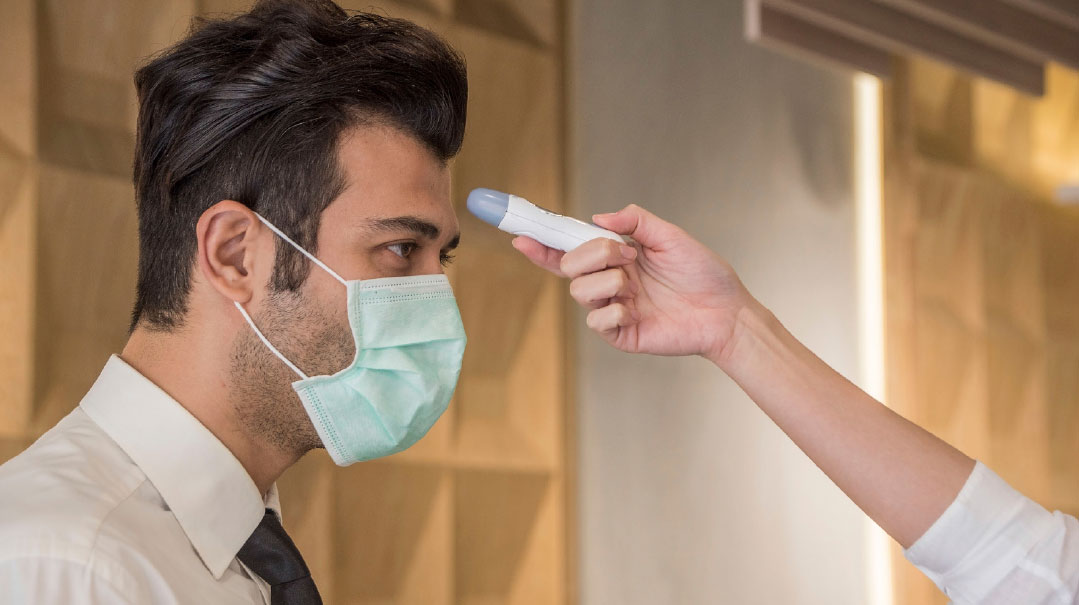


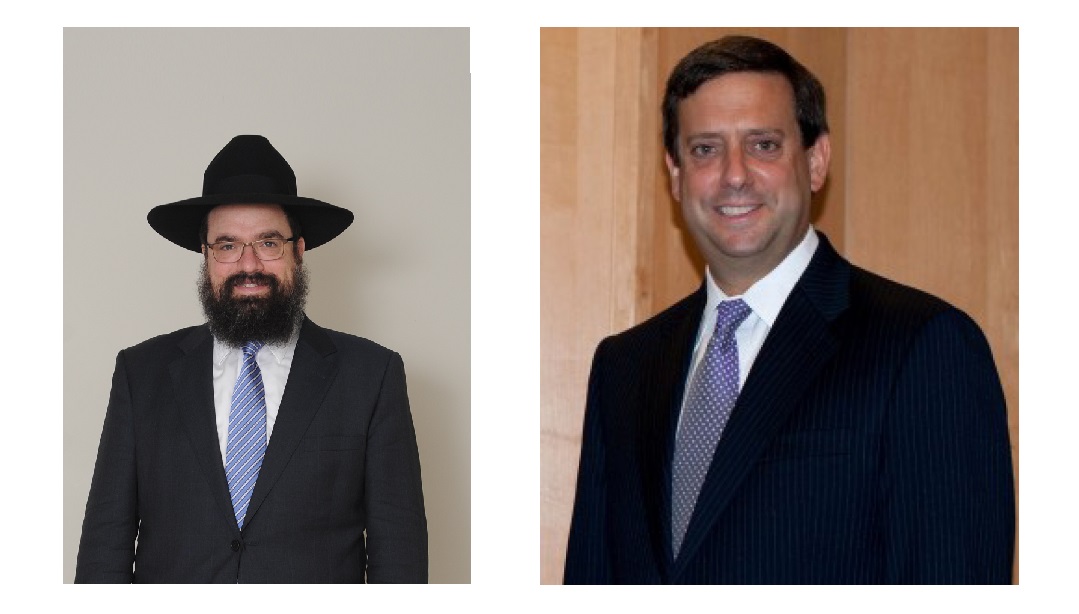


Comments (1)